What Sleep Deprivation Does to Mental Health
Recent research suggests that sleep deprivation can actually cause or contribute to mental health issues.
Escrito por Rachel Unger

01 Sleep plays an essential role in our physical and mental well-being.
02 Total or partial sleep deprivation negatively impacts mood, motivation and job performance.
03 Over time, sleep deprivation may increase the chances of developing depression or other mental disorders, especially when we’re under stress.
You know the feeling. You didn’t get enough sleep — again. Your brain is sluggish, and no amount of coffee will banish the mental fog. Something that wouldn’t normally stress you out, has the ability to send you into a spiral.
In the US, at least one-third of adults aren’t getting the recommended minimum of seven hours’ sleep. Seven hours may sound like a luxury, one that can’t be afforded in an “always on” culture that values unrelenting hustle. But when we get less than adequate sleep, we are at a higher risk of developing major health issues like obesity, diabetes, heart disease and stroke in the long-term. We are more accident-prone, less effective at our jobs and our quality of life suffers — especially in terms of our mental health.

What Happens to Your Body and Brain If You Don't Get Sleep
Sleep expert Matthew Walker breaks down the many effects of sleep deprivation on your brain and body.
Lack of sleep can make it difficult to control our emotions and behaviors. When we sleep less than we should, we accumulate what is known as “sleep debt.” Sleep deficiency has been shown to alter brain activity in the amygdala, which regulates our emotions and plays a significant role in the mechanisms of sleep. With sleep debt, there’s more activity in the amygdala, and that leads to emotional instability.
Sleep deprivation has been found in depression, anxiety and suicide; in fact, an estimated 40% of those suffering from insomnia also have a mental health condition.
Poor sleep quality has been recognized as a signature of conditions like major depressive disorder (hypersomnia or insomnia), bipolar disorder (decreased sleep need) generalized anxiety disorder (disturbed sleep), and post-traumatic stress disorder (difficulty falling or staying asleep).
Why Our Brains Need Sleep
In order to better understand the effects of sleep deprivation, it’s important to know the two basic types of sleep: rapid eye movement (REM) sleep, when most of our dreaming takes place, and non-REM sleep, which has three different stages.
During a typical night of rest, you cycle between REM and non-REM sleep, with longer, deeper REM sleep taking place closer to the morning. As you doze off and progress through the different stages of sleep, your breathing, heartbeat, and brain waves slow, and your muscles relax. The kind of restorative sleep that we require to feel refreshed in the morning happens during the later stages of non-REM sleep. We need both REM and non-REM sleep to consolidate memories and clear out the waste that accumulates when we’re awake. Chronic deprivation of REM sleep is related to changes in brain function that can alter mood.
Condiciones relacionadas
Sleep Deprivation as a Causal Factor
Recent research suggests that sleep deprivation can actually cause or contribute to mental health issues. Insomnia and other sleep problems, like trouble falling asleep, staying asleep or waking up too early, increase the chances of developing depression or a panic disorder.
Non-depressed people with insomnia are twice as likely to develop depression compared to those who don’t struggle with sleep. And researchers report that those suffering from depression who are also sleep-deprived have longer episodes of established depression, are less likely to respond to treatment, and are more likely to relapse following treatment. In addition, when compared to depressed patients with no sleep difficulties, depressed patients with disturbed sleep patterns are more likely to think about and die by suicide. Lack of sleep can also trigger a manic episode for those with bipolar disorder.
Tips for Better Sleep
To stave off the mental health issues that result from a lack of sleep, experts recommend maintaining a regular sleep schedule and waking up at the same time each day. Cutting back on substances like caffeine, alcohol, and nicotine can also help. Other tips for good sleep hygiene include getting regular exercise, avoiding food and drink close to bedtime, using the bedroom solely for sleeping and sex, and turning off electronics. If you’re seriously struggling with sleep problems, there are a number of treatments that can help, including cognitive behavioral therapy, medication, and lifestyle changes.
Sleep deprivation and mental health disorders can exacerbate each other in an increasingly harmful cycle. The relationship between sleep and mental health continues to be a topic of interest for researchers as they try to unravel the mysteries of sleep function and regulation. Given the pervasive impact that sleep deprivation has on our mood and overall well-being, it’s vital to address sleep deprivation as a public health issue, both at home and in the workplace.
Sobre el autor
Rachel Unger is a writer and editor based in Washington, D.C. She's passionate about raising mental health awareness and promoting fairness in the workplace.
Apoya nuestro trabajo
Nuestra misión es cambiar la manera en que el mundo percibe la salud mental.



















